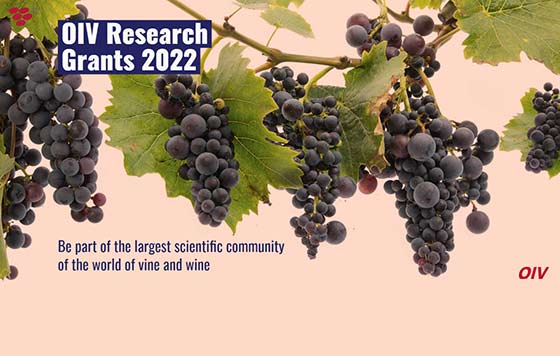
OIV 2022 Wine Research Grants
Year after year the International Organization of Vine and Wine (OIV) and within the framework of the development of its Strategic Plan grants scholarships for wine research in its priority programs. The themes are conservation and sustainable management of biodiversity and ecosystems in the transition to a nature-friendly wine value chain; sustainable management and adaptation to climate change; and living and healthy soils in viticulture.
Each year, the OIV awards scholarships for wine research, which on this occasion may be of three years or of short duration (from six months to a maximum of fifteen months) and are offered for specific training at the post-university level.
As a new form of collaboration in the activities of the OIV, a consortium bringing together 5 wine companies will promote and support the organization’s research and development work.
This year, the consortium of international companies (Familia Torres of Spain, Moët & Hennessy of France, Sogrape of Portugal, Viña Concha y Toro of Chile and Yalumba Family Winemakers of Australia) makes a contribution equivalent to that determined by the OIV, which allows to offer different types of research grants.
Priority themes for 2022 research grants
This year the OIV details that special attention will be paid to the following aspects to apply for wine research grants:
- Conservation and sustainable management of biodiversity and ecosystems in the transition to a nature-friendly grape and wine value chain
- Sustainable management and adaptation to climate change.
- Living and healthy soils in viticulture.
Priority themes according to the three research areas
a) Vineyard soil regeneration and sustainable agro-ecosystem management in the vineyard.
b) Development, testing and evaluation of biodiversity indicators applicable at vineyard level and to landscape management of wine regions (soil management)
c) Key methods and indicators of CO2 storage capacity in vineyard soil (mitigation).
d) Reduction and new approaches and alternatives to reduce the application of traditional plant protection products (copper, biostimulants or others).
Other issues of importance
- Inventory, study and conservation of genetic resources and genotypes of old varieties and old vines.
- Study of new techniques to fight diseases and their vectors in the vine: use of viruses against viral attacks, physical treatments, resistance to yellowing, sustainable management against scarring.
- Tolerant varieties to cope with abiotic stress.
- Sustainable use of water in the production of table grapes and water footprint in the wine sector.
- Regenerative production in the wine sector.
- Costs and financial aspects in the transition to better soil health and better carbon sequestration by vineyard soils.
- Evaluation of sustainability (product cost analysis) and economic performance of agri-environmental policies, taking into account the concepts of natural capital, biodiversity, environment and carbon sequestration, among others.
- Comparison of environmental certifications in the wine sector.
- New challenges, opportunities and competitive and organizational models in the wine sector: ecological and digital transition, supply chain logistics and international trade.
- Sustainable wine tourism as a key actor in the preservation and promotion of human, social and cultural values (of the wine landscape).
- Study of energy savings in the fermentation process.
- Studies on products and by-products of yeasts not Saccharomyces.
- New techniques for the recovery and exploitation of by-products in the wine sector.
- Treatment of wine instabilities (calcium instability, mannoproteins).
- Reduction of sulphur dioxide at a technological and microbiological level («minimum intervention wines», wines produced without adding SO2).
- Development and validation of analytical methods to quantify the addition of exogenous water to grape juice, must or wine, and influence of new technologies on analysis.
- Contaminants, toxins and additives (zinc and aluminum, among others).
- Assessment of health risks posed by residues of plant protection products.
- Biological and health effects of the consumption of wine or new grape products (literature review, mechanisms of action and clinical trials, among others).
- Nutritional and health benefits of the consumption of table grapes, raisins and grape juice.
- Changes in consumption habits and consumer perceptions: nutrition labelling, health warnings or alternative product certifications.
SOURCE: TECNOVINO.COM
